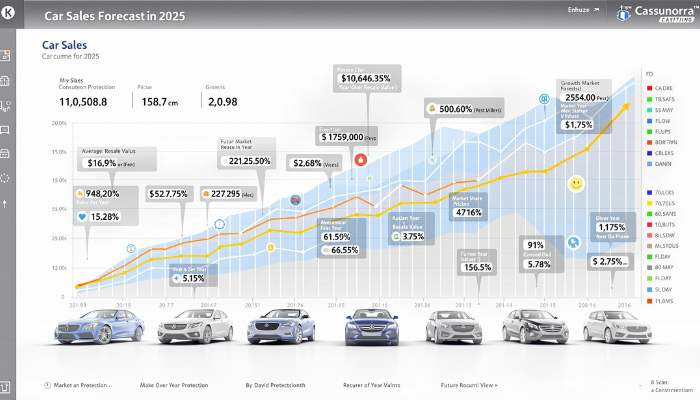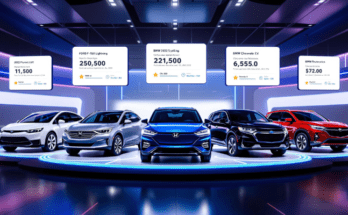Introduction
Automotive industry is a big industry across the world that supports the development of many economies. It means that if the buyers know about the future trends these changes can influence their decision to buy a given product because of the constant use of technology, changing consumers’ preferences, or varying environmental policies. In it we will discuss why the resale value of a car in 2025 could be expected to rise and fall.
Impact and Effect of Electric Vehicles
EVs have, in recent years, Lowered into popularity because of the rising awareness of the impacts of global warming and emissions of carbon monoxide. It is necessary to note that high popularity of electromobiles may lead to some changes in the automotive market and directly affect their reconditioned value. In the beginning, two different models of electric vehicles were fairly alike with little consumer interest; however, advances in technology provide vehicles with a longer range, more up-to-date ability to charge rapidly, and enhanced battery life expectancy. This progress may result to high demand for electric cars, which in turn would lead to increased resale value of the electric cars in the future.
Further, more government policies are tilted in the direction of cleaner transport vehicle,; thus the number of charging stations is on the rise. When the environment is more favorable, the consumers will consider owning the EVs, which in turn enhances its resale value over time.
Robotics in Car Industry – Autonomous Driving
The technology of automobile pilotage is changing perception concerning transport in the society. Since self-driving cars are rapidly becoming part of our society, their classification into levels of resale will also take different trends. Fully autonomous cars can only see a rise in their resale value but for the rest of the cars with varied levels of automation the shift from human control to autopilot could be a mixed blessing. But in the short run, fully manual vehicles can suffer from the loss of market value while in the long run, the depreciating rates can only stabilize as demand for fully autonomous vehicles rise.
The second section is illustrated by Predictive Maintenance and Software Updates
Thanks to the development of connected car technology it is now possible to have a perfect real-life example of Predictive Maintenance. Modern cars are fitted with sensors that can let a driver know there is a problem with the car and it needs fixing. This capability makes it easier to avoid frequent breakdowns, and cutting the costs of maintenance thus helping to improve the value of used cars. Also, frequent updates of car software give a car more ability and security and factors that will attract a buyer.
The Effect of Shared Mobility Services
Some advanced executive and renting services like Uber, Lyft, and Car2Go have shifted customer preferences and, as a result, have cut down their demand for owning personal cars. The shift could diminish resale values of vehicles for firms in the car manufacturing business in the short term. Car sharing tend to prefer low kilmeter and well maintained cars, this may actually retain or even increase the value of new well maintained cars.
Eco-friendly Technologies
There are new trends toward more environmentally friendly technologies at present, including hybrid and plug in hybrid vehicles. As there will be more general awareness of how the use of fuel has an effect on the environment, these vehicles that use less fuel will be expected to have higher resale value. That’s why manufacturers also are developing flexible fuel vehicles (FFVs) that can run on gasoline, ethanol or a mixture of the two. They could, in the future, become more in demand and hence have high resale value as the current models.
Measures of Government Support
Auto policies create and influence the automotive industries in different ways. Economical measures, including incentives for auto environment protection, or regulatory policies that limit uses of automobiles with ?high emission’ also affect car resale value. For example, the fuel economy standards set up by the EPA would need car makes to produce cars which can meet and surpass those standards. Of course, that sort of policies can benefit and be effective for the resale value of eco-friendly cars.
Depreciation Rates and Reliability Ratings
The rate of depreciation on any given vehicle varies according to the make, model, and year, of manufacture of the particular car. In general variety, luxurious vehicles and cars with powerful engines become a victim of early decrease in value more than mid- or low-range, useful vehicles. They can also greatly affect resale values depending on the reliability ratings — whether that was from J.D. Power or the Consumer Reports side. The main reason for above observation is that the vehicles which have been enjoying good ratings both in the performance and in dependability are the ones that experience faster depreciation.
Conclusion
The future of car resale values is unknown but knowing what will influence the market can help give a clearer picture. Upgrades in science and technology, policies amid the government and preferences of the customers will go hand in hand to herald the resale value forecasts of the year 2025 and beyond. Both car buyers and sellers need to monitor these factors in order to fully understand when and where they can make good investments and provide good user experiences.




